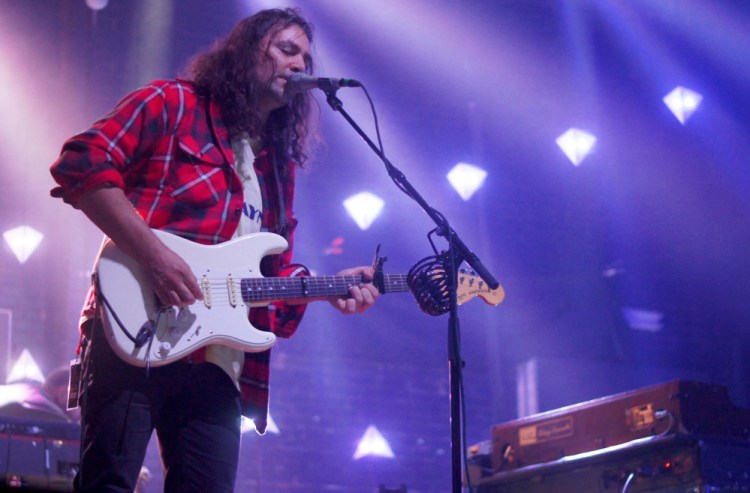The War on Drugs is a band that is largely concerned with texture. Their songs recall 1980s epics like Don Henley’s “The Boys of Summer” and Bob Seger’s “Against the Wind,” with windswept landscapes, wistful lyrics and a midtempo rhythm so sturdy that it seems built with certified U.S. steel.
They don’t compose direct pastiches to these influences, however. They stir up impressionistic interpretations of heartland rock, calling to mind memories of being a child in the ’80s, sitting in the back seat as your parents turn the radio dial and catching a few bright-colored synth lines here and a nagging feeling of remorse there.
Their live shows, however, find them moving to the front seat and taking hold of the steering wheel. Their songs remain long affairs that unspool in grand washes of sustained riffs and guitar noodling, but they don’t amble pleasantly so much as roar with a white-knuckled assertiveness – springing to life like the musical equivalent of a Deadhead sticker on a Cadillac.
On Monday, the Philadelphia band launched the tour behind their most recent album, “A Deeper Understanding,” in Portland, playing a set that featured most of that record along with fan favorites from their 2014 breakthrough, “Lost in the Dream.” In an era of music when few new rock bands can boast cross-generational appeal, the War on Drugs has enjoyed a rise to prominence with these two albums; the audience was a healthy mix of millennials and those old enough to recall the era from which the band took its name, and they all seemed largely transfixed by the band’s excursions. Songs were met with little in the way of overt engagement, even on the rare compositions in which the drumming was foregrounded, yet at the songs’ conclusions, the reception was often rapturous.
These songs were long, but rather than taking us through spectacular peaks and valleys similar to a band like Phish, War on Drugs jams by burrowing deeper and deeper into their aesthetic, closer to Neil Young and Crazy Horse. At times, there were three people on stage playing keyboards at once, in addition to the rhythm section, with singer, songwriter and lead guitarist Adam Granduciel taking up position in the eye of the hurricane, singing with the pinched diction of 1990s Bob Dylan and enjoying himself in the fashion of the career musician who is relishing his big break to larger stages.
With the sustained keyboard riffs melding together into a grandiose hum, it often felt like the band was generating a canvas that Granduciel could throw swaths of paint against like Jackson Pollock. Against a spare stage setting – more bands should take advantage of the State Theatre’s brick backdrop – he sang lyrics that looked back not in anger or sadness, but with perspective and a degree of resignation. It was altogether fitting for a concert that seemed deliriously tethered not to the present but some hazy, half-forgotten moment.
Robert Ker is a freelance writer who lives in Portland.
Send questions/comments to the editors.


